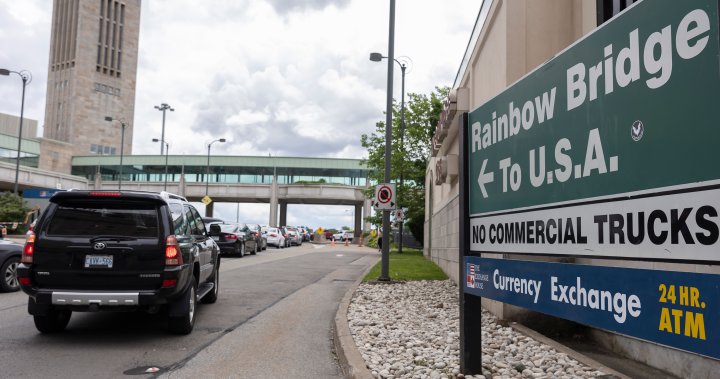World
Wall Street has its worst day since 2022 as fears of U.S. recession deepen | CBC News

Wall Street fell the most in nearly two years, continuing a global rout in financial markets as fears worsen that the U.S. economy is slowing down.
The S&P 500 fell three per cent on Monday. The Dow Jones industrial average dropped more than 1,000 points and the Nasdaq composite slid 3.4 per cent.
The declines were just the latest in a global sell-off following a 12.4 per cent plunge in Japan’s Nikkei 225, its worst day since the Black Monday crash of 1987.
It was the first chance for traders in Tokyo to react to a Friday jobs report that showed hiring by U.S. employers slowed last month by much more than expected. That has convulsed financial markets, vanquishing the euphoria that had taken the Nikkei 225, a stock market index for the Tokyo Stock Exchange, to all-times highs of over 42,000 in recent weeks.
Professional investors cautioned that some technical factors could be amplifying the action in markets, but the losses were still jaw dropping. South Korea’s Kospi index careened 8.8 per cent lower, stock markets across Europe sank more than two per cent and bitcoin dropped below $55,000 US from more than $61,000 on Friday.
The shakeup began just a couple of days after U.S. stock indexes had jumped to their best day in months, in the wake of Federal Reserve chair Jerome Powell setting the stage for possible rate cuts to begin in September.
But after Friday’s jobs report, there have been rising worries that the Federal Reserve may have kept its main interest rate at a two-decade high for too long, raising risks of a recession in the world’s largest economy.
Now, traders are wondering if the damage has been so severe that the Fed will have to cut interest rates in an emergency meeting, before its next scheduled decision on Sept. 18.
“The Fed could ride in on a white horse to save the day with a big rate cut, but the case for an inter-meeting cut seems flimsy,” said Brian Jacobsen, chief economist at Annex Wealth Management. “Those are usually reserved for emergencies, like COVID, and an unemployment rate of 4.3 per cent doesn’t really seem like an emergency.”
“The Fed could respond by stopping” the shrinking of its holdings of treasuries and other bonds, which could put less upward pressure on longer-term yields, he said, noting that could show “at least by a symbolic action, that they’re not blind to what’s going on.”
A rate cut would make it less expensive for U.S. households and companies to borrow money, but it could take time for the effects to boost the economy.
A worldwide decline
Until Friday, there had been relatively few huge market swings in the past year.
A bonanza around artificial intelligence technology helped drive big tech stocks higher, while other areas of the market held up amid rising hopes for coming cuts to interest rates by the Federal Reserve.
But professional investors have been warning that shakier times may be ahead, given uncertainty about how quickly the Federal Reserve will cut interest rates and other big questions.
On Monday, the Nikkei closed down 4,451.28 points at 31,458.42 after dropping 5.8 per cent on Friday, making this its worst two-day decline ever.
European markets also opened lower Monday, with Germany’s DAX down 2.3 per cent at 17,267.00, the CAC 40 in Paris losing 1.9 per cent to 7,114.33 and the FTSE 100 in London 2.1 per cent lower at 8,004.19.
Canada’s main stock index, the S&P/TSX composite, fell 2.1 per cent on Friday as major energy, technology and industrial stocks all tumbled, marking its steepest drop since mid-February. Monday is the Civic Holiday across Canada except in Quebec.
Global financial markets suffered massive losses on Monday, fuelled by fears of a possible recession in the U.S. The sell-off has prompted a push for the U.S. Federal Reserve to call an emergency meeting to consider cutting its key interest rate ahead of schedule.
Darkening the outlook for trading on Wall Street, early Monday, the future for the S&P 500 was 2.5 per cent lower and that for the Dow Jones Industrial Average was down 1.6 per cent.
Share prices have fallen in Tokyo since the Bank of Japan raised its benchmark interest rate on Wednesday. The Nikkei is now down 3.8 per cent from a year ago.
The Japanese yen also has fallen sharply, trading at 142.37 yen, down from 146.45 late Friday and sharply below its level of over 160 yen a few weeks ago.
Even gold, which has a reputation for offering safety during tumultuous times, slipped 1.6 per cent.
Big tech hit hard
Making things worse for Wall Street, big tech stocks also tumbled sharply as the market’s most popular trade for much of this year continued to unravel.
Apple fell 4.6 per cent Monday after Warren Buffett’s Berkshire Hathaway disclosed it had slashed its ownership stake in the iPhone maker.
Nvidia, the chip company that’s become the poster child of Wall Street’s AI bonanza, fell even more, 8.3 per cent. Analysts cut their profit forecasts over the weekend for the company after a report from The Information said Nvidia’s new AI chip is delayed. It has trimmed its gain for the year to 98.7 per cent from 170 per cent in mid-June.
South Korea’s Kospi plummeted more than nine per cent as Samsung’s shares sank 10.3 per cent. Taiwan’s Taiex also crumbled, losing 8.4 per cent as Taiwan Semiconductor Manufacturing Co., the world’s biggest chip maker, dropped nearly 10 per cent.
“To put it mildly, the spike in volatility-of-volatility is a spectacle that underlines just how jittery markets have become,” Stephen Innes of SPI Asset Management said in a commentary.
“The real question now looms: Can the typical market reflex to sell volatility or buy the market dip prevail over the deep-seated anxiety brought on by this sudden and sharp recession scare?”
Investors worry about drops
Even though worries over weakness in the U.S. economy and volatile markets have rippled around the world, the American economy is still growing, and a recession is far from a certainty.
Goldman Sachs economist David Mericle anticipates a higher chance of a recession following Friday’s jobs report. But he still sees only a 25 per cent chance of that, up from 15 per cent, in part “because the data look fine overall” and he does not “see major financial imbalances.”
Some of Wall Street’s recent declines may also simply be air coming out of a stock market that romped to dozens of all-time highs this year. Critics have been saying that the stock market looked expensive after prices rose faster than corporate profits.
“Markets tend to move higher like they’re climbing stairs and they go down like they’re falling out a window,” according to JJ Kinahan, CEO of IG North America. He chalks much of the recent worries to euphoria around AI subsiding and “a market that was ahead of itself.”
Professional investors also pointed to the Bank of Japan’s move last week to raise its main interest rate from nearly zero. Such a move helps boost the value of the Japanese yen, but could also force traders to scramble out of deals where they borrowed money for virtually no cost in Japan and invested it elsewhere around the world.
Canada’s economy is showing many hallmarks of a recession — rising unemployment and bankruptcies, less consumer spending — yet it’s still growing. Andrew Chang explains the disconnect and what may be behind it all.
But the mood is decidedly dark. The VIX, an index that measures how worried investors are about upcoming drops for the S&P 500, was up 105 per cent as of early Monday.
Investors will be watching for data on the U.S. services sector from the U.S. Institute for Supply Management due later Monday that may help determine if the sell-offs around the world are an overreaction, Yeap Jun Rong of IG said in a report.












